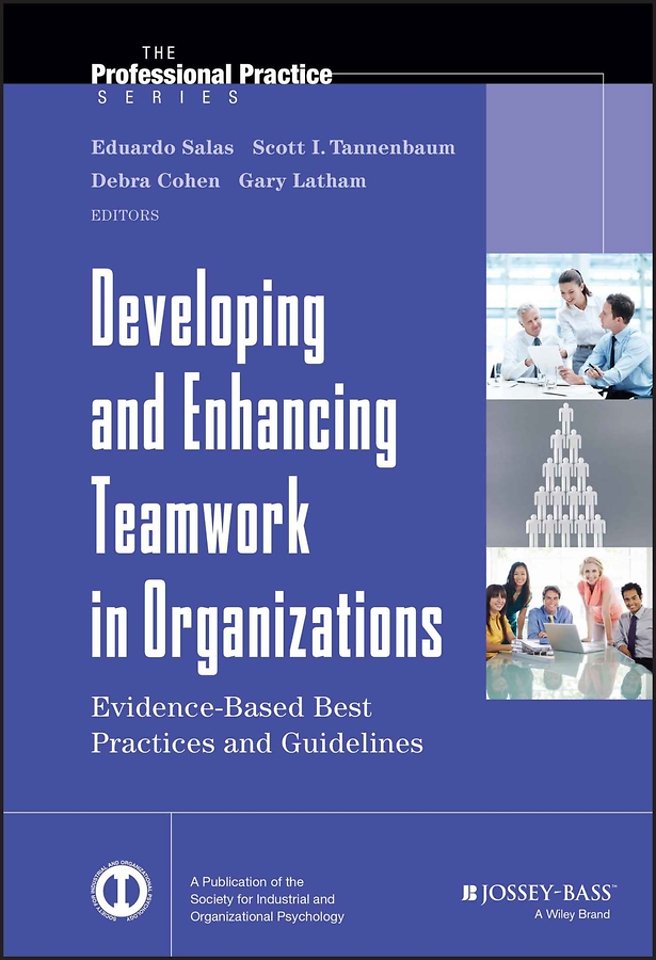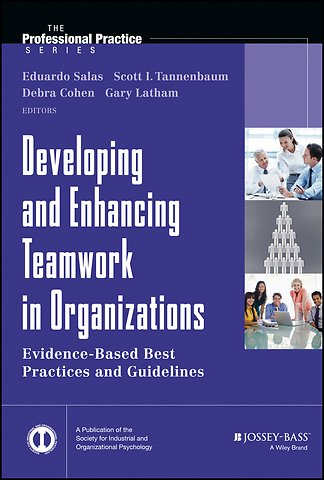Developing and Enhancing Teamwork in Organizations – Evidence–Based Best Practices and Guidelines
Evidence–based Best Practices and Guidelines
Gebonden Engels 2013 9781118145890Samenvatting
This new volume in the SIOP Professional Practice Series provides evidence–based guidelines to help practitioners seeking advice, recommendations, and guidance for developing and enhancing high–performance teams. Co–Published by the Society of Industrial and Organizational Psychology, this volume features all–star editors and contributors highlighting the evidence, the lessons learned, the principles and the findings that matter when composing and managing work teams. Global I/O faculty and practitioners, students, and HR professionals will benefit from discussion on the organizational influence on teams; the leader′s contribution to the teams; and how context matters in teams.
Specificaties
Lezersrecensies
Inhoudsopgave
<p>The Editors xv</p>
<p>The Contributors xvii</p>
<p>Part 1: Why Teamwork Matters in Organizations 1<br /> <br /> 1 Teamwork in Financial Institutions Does It Really Matter? 3<br /> Michael J. Castellana, CEO, SEFCU</p>
<p>2 Do Teams Leaders Really Matter? 6<br /> COL Casey Haskins, U.S. Military Academy, West Point</p>
<p>3 Teamwork Matters 11<br /> Peter J. Pronovost, Johns Hopkins University</p>
<p>4 Making a Difference with Health Care Teams 13<br /> Victor V. Buzachero, Scripps Health</p>
<p>5 Developing Leaders on Any Team 17<br /> George O Leary, Head Football Coach, University of Central Florida</p>
<p>6 Teamwork and Spaceflight An Evolving Relationship 22<br /> Daniel W. Tani, Astronaut, NASA</p>
<p>Part 2: Th e Organization and Its Influence 25</p>
<p>1 Silent Killers of Team Performance: How Honest, Collective, and Public Conversations Can Overcome Them 27<br /> Michael Beer, Harvard Business School and TruePoint</p>
<p>2 How Organizational Process Maturity Improved Software Team Performance 48<br /> Bill Curtis, CAST Software</p>
<p>3 Leading a Team to a Major Technological Development 85<br /> Kazem Rassouli, University of Toronto, Rotman School of Management</p>
<p>Part 3: The Team Leaders 119</p>
<p>4 Building Great Leadership Teams for Complex Problems 121<br /> Ruth Wageman, Harvard University</p>
<p>5 Developing High–Impact Teams to Lead Strategic Change 154<br /> Kate Beatty and Roland B. Smith, Center for Creative Leadership</p>
<p>6 Leading Executive Teams: The Good, the Bad, and the Ugly 182<br /> Susan R. Meisinger, Society for Human Resource Management</p>
<p>7 Leading from the Helm: Lessons from America s Cup Sailing Teams 208<br /> Mark A. Clark, American University</p>
<p>Part 4: The Organizational Context 237</p>
<p>8 Virtual Teams: The How To s of Making Being Virtually There Successful 239<br /> Debra J. Cohen and Alexander Alonso, Society for Human Resource Management</p>
<p>9 Trust and Conflict at a Distance: How Can I Improve Relational Outcomes in Distributed Work Groups? 268<br /> Jeanne Wilson, The College of William and Mary</p>
<p>10 Teamwork Improvement in Health Care: A Decade of Lessons Learned Every Organization Should Know 298<br /> Sandra A. Almeida, MD, LLC, Healthcare Consulting, Heidi King, TRICARE Management Activity, and<br /> Mary L. Salisbury, The Cedar Institute, Inc.</p>
<p>11 Why Teamwork Matters: Enabling Health Care Team Effectiveness for the Delivery of High–Quality Patient Care 331<br /> Joanne Lyubovnikova, Aston University, and Michael A. West, Lancaster University</p>
<p>12 Rethinking Team Diversity Management: Evidence–Based Strategies for Coping with Diversity Threats 373<br /> Mirko Antino, Universidad Complutense de Madrid, Ramón Rico, Universidad AutonOma de Madrid,<br /> Miriam Sánchez–Manzanares, Universidad Carlos III de Madrid, and Dora C. Lau, Chinese University of<br /> Hong Kong</p>
<p>13 High Performance in Temporally Separated Team Work 406<br /> J. Alberto Espinosa, Kogod School of Business, American University</p>
<p>Part 5: Th e Assessments, Applications, and Interventions for Teams 439</p>
<p>14 Designing, Delivering, and Evaluating Team Training in Organizations: Principles That Work 441<br /> Megan E. Gregory, Jennifer Feitosa, Tripp Driskell, and Eduardo Salas, Department of Psychology,<br /> Institute for Simulation and Training, University of Central Florida, and William Brandon Vessey, EASI/Wyle, NASA Johnson Space Center</p>
<p>15 Conducting Team Debriefings That Work: Lessons from Research and Practice 488<br /> Scott I. Tannenbaum, Rebecca L. Beard, and Christopher P. Cerasoli, Group for Organizational Effectiveness, Inc.</p>
<p>16 Achieving Optimal Team Composition for Success 520<br /> John E. Mathieu, University of Connecticut, Scott I. Tannenbaum, Jamie S. Donsbach, and George M. Alliger, Group for Organizational Effectiveness, Inc.</p>
<p>17 How, When, and Why You Should Measure Team Performance 552<br /> Kimberly A. Smith–Jentsch, Mary Jane Sierra, and Christopher William Wiese, University of<br /> Central Florida</p>
<p>18 Team Time Management: Psychological Insights for Timely Project Performance 581<br /> Josette M.P. Gevers and Christel G. Rutte, Einhoven University of Technology, Netherlands</p>
<p>19 Five Simple Processes That Improve High–Risk Team Effectiveness 609<br /> Michaela Kolbe, ETH Zurich, Switzerland</p>
<p>Part 6: Summary 645</p>
<p>20 Enhancing the Practice of Teamwork in Organizations: Emerging Themes 647<br /> Stephanie Zajac and Eduardo Salas, University of Central Florida</p>
<p>Name Index 661</p>
<p>Subject Index 680</p>
Anderen die dit kochten, kochten ook
Rubrieken
- advisering
- algemeen management
- coaching en trainen
- communicatie en media
- economie
- financieel management
- inkoop en logistiek
- internet en social media
- it-management / ict
- juridisch
- leiderschap
- marketing
- mens en maatschappij
- non-profit
- ondernemen
- organisatiekunde
- personal finance
- personeelsmanagement
- persoonlijke effectiviteit
- projectmanagement
- psychologie
- reclame en verkoop
- strategisch management
- verandermanagement
- werk en loopbaan







